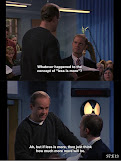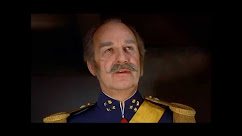
[In 2011], I read
Kim by Rudyard Kipling for a bookclub and really enjoyed it. I then watched the 1950 film with Dean Stockwell and Errol Flynn.
The movie is fairly good. It was "filmed on location." This means that a bunch of outdoor shots were filmed in India; everything else was done on a sound-stage.
But the movie does have a semi-authentic feel to it (I was worried that it would be like
The Ten Commandments, which I enjoy watching but is hokey in the extreme: just watch Joshua organizing the Israelites in his best "Are we ready, boys and girls?" camp counselor manner.)
Kim is surprisingly straightforward and non-hokey, sticking closely to the book up until the last twenty minutes.
At which point it suddenly takes a nose-dive into . . . I don't know. I don't know what they were trying to do. I don't think they knew what they were trying to do.
 I have a theory.
I have a theory. Up until the last twenty minutes, the film focuses on Kim, played perfectly by Dean Stockwell. At fourteen, Stockwell has the compact, dark exuberance that Kipling ascribes to Kim.
But he isn't quite old enough to play Kim at seventeen (this is a pity; if Stockwell had been only a year older, he could have played Kim's younger and older selves with little difficulty). Consequently, the action from the book is squeezed from approximately five years into 1-1/2. Kim is still a child when he goes to hunt the Russian spies.
Kipling wouldn't have a problem with this. In the book, he continually emphasizes that Kim's controllers want to mold but not break him. They release him from his "English" studies as quickly as possible. They want him educated (and loyal), not disciplined to be a rigid, unimaginative, British officer.
 |
| Though very different in their politics, neither Forster nor |
| Kipling had a high opinion of this version of India. |
|
This approach dovetails nicely with Kipling's beliefs regarding India. He supported the British Empire, but he believed (correctly) that it was badly managed. He believed, for example, that the British administrators in India should NOT be upperclass boys trained in England with no real knowledge of the country or ability to work with the native people. His book
Stalky & Co. is basically about the type of boys who
should be sent to administer India. Stalky, specifically, is a Kim proto-type.
So Kipling has Kim released from the British system as quickly as possible. He had little to no trouble sending this boy back into a dangerous environment. In fact, he implies that Kim was safer when he was younger and more savvy. Educate him any further, and he'll be too stupid to survive.
This idea was not something that 1950 America could readily stomach. The idea of "childhood" as a pure time of innocence had been growing since the Victorian era; post-WWII, middle-class American parents didn't want their kids being trained to play the "Great Game." They wanted them in college, learning to be businessmen and therapists and school-teachers.
Subsequently, the end of the film
Kim turns into a film about Errol Flynn. Errol Flynn must go rescue Kim who has recklessly decided to play "the game" at too young an age. At the very end of the film, it is heavily implied that Kim will go back to school and once he graduates, he won't need to be a spy since all wars will be over.
In fact, there's an interesting contrast (which the writers of the script presented but didn't know what to do with) between the "old school" swashbuckling Flynn, who gets a kick out of killing his enemies, and the "new school" Kim, who gets squeamish out of watching people die.
This is not completely out of keeping with the book. In the book, Kim develops a more complex understanding of morality than he starts out with. The change is necessary since Kim is cocky to the point of arrogance; he is only reined in by his mentor, the extremely pacifistic lama. At the end of the book, the lama--who has obviously been worrying over Kim's participation in "the game"--has a vision which comforts him with the belief that Kim will be able to act as a spy without losing his soul. (At the end of the film, the confused script-writers have the lama die. They obviously couldn't make up their minds whether to be pro-War or pro-pacifism. All they knew is children should have cozy lives.)
In the book, the lama's influence keeps Kim from turning into a little sociopath with no moral sense or direction except the desire to outwit people. In the film, the implication is that the lama represents a nice New Agey way to think for boys who no longer have to make hard choices where people put their lives on the line.
Wishful, post-WII thinking. And, considering the instant inception of the Cold War, rather naive. But Kim is a child and, as a child, he must be protected!
And the infantilization begins.

The one major factor in the film's favor is Dean Stockwell. It is impossible for a late-20th century product like me not to associate Dean Stockwell-the-child with Dean Stockwell-the-adult. (Especially since at age 14, Stockwell already had that borderline look of amused insolence down pat.) I see Kim and I think . . . Al! From
Quantum Leap. And they aren't that different. Kim has that Buddhist edge. But the kindness masked by insouciance coupled with incredible energy is pure Kim/Al. And Stockwell does it very well.
So, Kim didn't grow up to be a businessman (or a monk, as one author postulates). He grew up to work in a top-secret laboratory doing science experiments that result in time-altering adventures.
The last really is much more likely.



















































